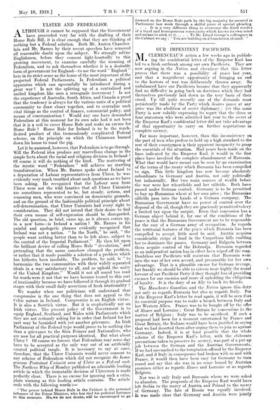ULSTER AND FEDERALISM.
ALTHOUGH it cannot be supposed that the Government have proceeded very far with the drafting of their Home Rule Bill, it is clear enough that they are thinking of nothing but a Federal solution. Both Mr. Austen Chamber- lain and Mr. Barnes by their recent speeches have removed all reasonable doubt upon the subject. We strongly advise Englishmen, before they consent light-heartedly to this growing movement, to examine carefully the meaning of Federalism, and to ask themselves whether it is a desirable form of government for England—to use the word " England " here in its strict sense as the home of the most important of the projected Federal Parliaments. Is Federalism a political apparatus which can successfully be introduced during a great war ? Is not the splitting up of a centralized and unified kingdom like ours a retrograde movement ? Is not the experience of Australia, South Africa, and Canada a proof that the tendency is always for the various units of a political community to draw closer together, and to centralize such vital things as the control of finance, commercial policy, and means of communication ? Would any one have demanded Federalism at this moment for its own sake had it not been that it is a veil to cover Home Rule and make an excuse for Home Rule ? Home Rule for Ireland is to be the much- desired product of this tremendously complicated Federal scheme, on the principle on which the Chinaman burned down his house to roast the pig.
Let it be assumed, however, that Federalism is to go through. Will the Federal idea produce any marvellous change in the simple facts about the racial and religious division in Ireland ? Of course it will do nothing of the kind. The muttering of the mystic word " Federalism " will achieve no startling transformation. When Mr. Barnes spoke about Ireland to a deputation of Labour representatives from Ulster, he was evidently very much troubled about such questions as we have been asking. He recognized that the Labour men from Ulster were not the wild fanatics that all Ulster Unionists are sometimes represented to be, but steady, serious, and reasoning men, who were convinced on democratic grounds, and on the ground of the fashionable political principle about self-determination, that Ulster Unionists had every right to consideration. They did not intend that their desire to find their own means of self-expression should be disregarded. The old question, in brief, came up, as it always conies up, in a new form—is Ireland a nation ? Mr. Barnes in his painful and apologetic phrases evidently recognized that Ireland was not a nation. " In the North," he said, " the people want nothing better than to be left alone, subject to the control of the Imperial Parliament." He then hit upon the brilliant device of calling Home Rule " devolution," and pretending that the name somehow changed the problem, or rather that it made possible a solution of a problem which has hitherto been insoluble. The problem, he said, is " to harmonize the two communities with their widely separated ideals in a way satisfactory to all, and so uphold the unity of the United Kingdom." Would it not all sound 'too mad for words were it not that we have become inured to this sort of irrationality because we have followed it through its gradual stages with their small'daily accretions of fresh irrationality ?
We wonder when our politicians will understand that compromise is the one thing that does not appeal to the Celtic nature in Ireland. Compromise is an English virtue. It is also a Scottish virtue. But it is emphatically not an Irish virtue. The present policy of the Government is to equip England, Scotland, and Wales with Parliaments which they are not seriously asking for in order that Ireland for her part may be furnished with yet another grievance. An Irish Parliament of the Federal type would prove to be nothing else than a grievance to the Sinn Feiners and Nationalists, who are now for all practical purposes identical. But what about Ulster ? Of course we foresee that Federalism may some day have to be accepted as the only way out of an artificially created political tangle. It is necessary to say at once, therefore, that the Ulster Unionists would never consent to any scheme of Federalism which did not recognize the homo- geneous Protestant Unionist area of Ulster as a Federal unit. The Northern Whig of Monday published an admirable leading article in which the immutable decision of Ulstermen is made perfectly clear. There is no excuse for ignoring such a calm, plain warning as this leading article contains. The article ends with the following words :— " The power behind Home Rule in the Cabinet is the personal influence of the Prime Minister, who has tied his political fortunes to this measure. He,we do not doubt, will be encouraged to go
forward on the Home Rule path by the big majority he secured in Parliament last week through a skilful piece of special pleading. . . . It is a very different thing to overcome the fixed resolve of a loyal and homogeneous community which knows its own mind and means to stick to it... . . To Mr. Lloyd George's colleagues in the Cabinet we say : You are building on a foundation of sand.' "


























 Previous page
Previous page